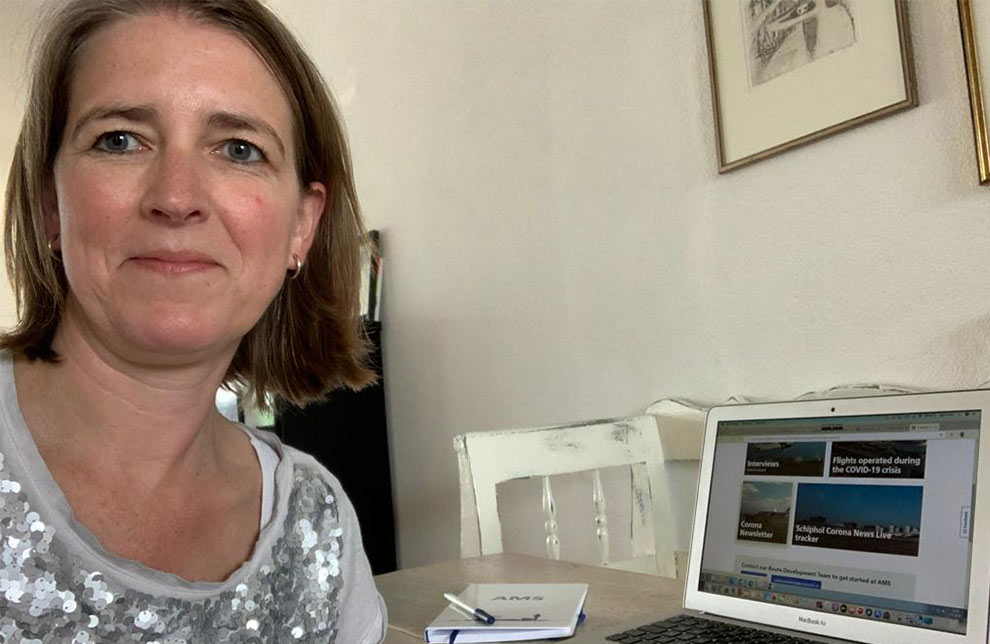What does it take to get travellers to choose a particular destination for business or leisure? And can those choices be influenced with the right campaign? Ebeline Dijkhuis, Partnership Marketer at Schiphol, knows they can. She works with travel and tourism bureaus and airlines to find ways to make sure the Netherlands gets its share of traveller traffic. And in the age of coronavirus, traveller sentiment is more important than ever.

Published on: 17 September 2020
Sharing insight for shared interest
Ebeline is responsible for the relationships Schiphol has with the local and national organisations that involve travel. She works closely with tourism boards, the Dutch travel trade, business travel organisations and meeting & conventions partners to ensure she stays connected to travellers in and out of the Netherlands.
‘We work to keep these relationships strong, since we all have the same interest – getting passengers to fly here,’ Ebeline explains. Keeping the relationships strong means sharing insights, working on campaigns, and identifying opportunities in the market by combining perspectives. ‘As Schiphol, we offer insight into airline and passenger needs, and the partners offer insight into traveller expectations, trends, and more.’
Reaching out for impact
In an effort to increase tourism from China, Ebeline and her colleagues worked closely with the NBTC’s branch in China to develop campaigns that attracted their target audience. Through webinars, video calls and other communication points, Schiphol worked with the team in China to uncover the best opportunities. ‘The closer we can get to our target audience, the more we can ensure that we understand their needs,’ Ebeline says. ‘It was great to share insights with the Chinese office of the NBTC and discover how we could really connect with travellers and business partners there.’
Tracking traveller sentiment
In recent months, Ebeline and the NBTC have been working on the issue affecting the entire industry: the coronavirus. While it is possible to travel between countries, traveller comfort will determine if they will actually fly. ‘Deciding to travel at this time is a personal thing,’ Ebeline explains. ‘We’re working with the NBTC to monitor how people feel about travel, so that we can focus our attention on the countries and regions that have the most opportunity.’ The NBTC utilises its own, existing network and methodology to reach out to a representative sample and ask about their travel plans.
The traveller Sentiment Monitor provides insight into how the coronavirus has impacted people’s plans for holidays. It currently focuses on Dutch, German, Belgian, French, UK, US and Chinese travellers. Updated each month, the monitor will also indicate trends over time, and offer ways that travel and tourism partners can focus on regions that are eager to cross borders again. ‘If we see that people in a particular country plan to take a holiday in September, we can be ready with campaigns to show them all the ways that Schiphol – and the Netherlands – are working to keep them safe. We hope that this will help the industry and our economy recover.’
All in this together
It’s not enough to tell travellers that it’s safe to travel. It actually has to be safe. ‘Schiphol has done everything we can to make this part of the passenger journey as carefree as possible. ‘We need to work with our partners to inform all potential passengers about how we’re ensuring a safe journey,’ Ebeline says. ‘Every partner in the journey can make a contribution.
Cooperating and connecting
Ebeline credits the excellent relationship with her external partners for keeping everything on track. ‘Cooperation with these organisations helps us, and helps the airlines,’ she says. ‘That’s why we’re ready to connect airlines with any of the Dutch tourism boards or traveller organisations to help stimulate activity. It’s only when we listen to each other, share insights and work together that we can all get the industry back on track.’